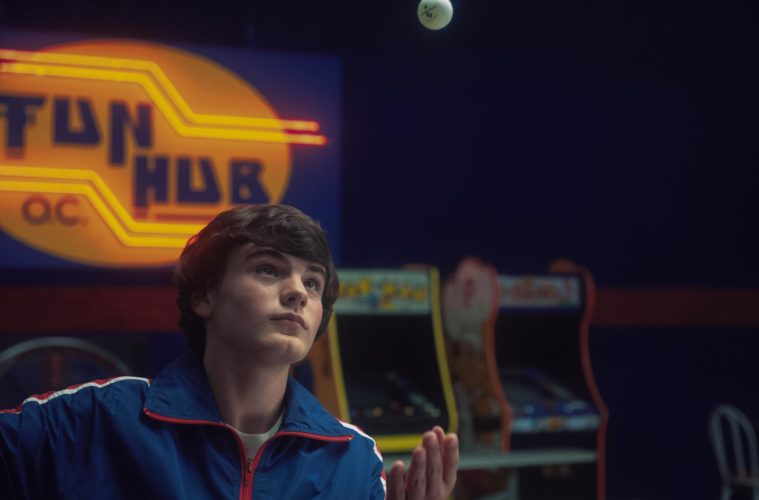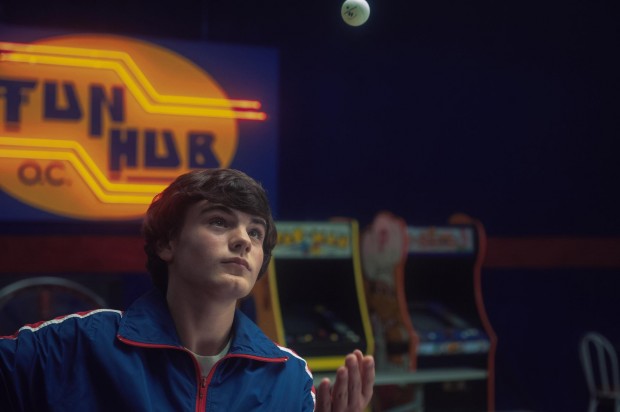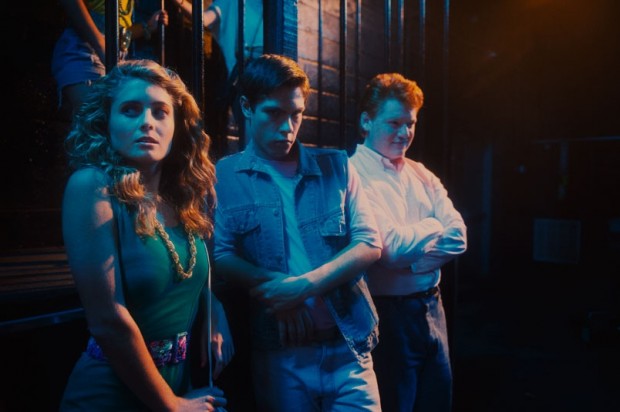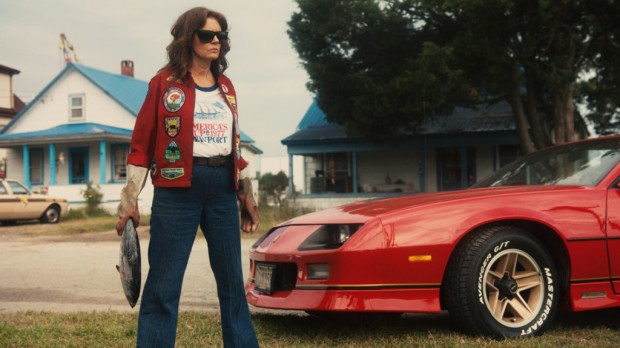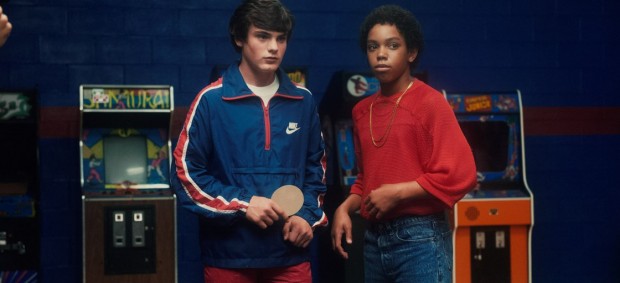Nostalgia can be an unwieldy tool in the world of filmmaking. Few features manage to effectively capture the charms of a certain time period, either going overboard to the point of exhaustion or poking fun of them so much it starts to feel disingenuous. Thankfully, Ping Pong Summer, which premiered in the NEXT section at this year’s Sundance Film Festival, takes us back to the 1980’s with charm, reverence and light, fun humor, as my review notes.
With the film now gearing up for a VOD and theatrical release this Friday, I had a chance to chat with writer-director Michael Tully, who returned to Sundance after 2011’s Septien. The topics ranged from the creation of his latest film to his experience overseeing his own site, and how he feels about the state of film journalism, to his recent undistributed favorites to VOD and more. Check out the full conversation below.
The Film Stage: Congrats on the movie. It was actually my last movie of Sundance this year, so it was a nice way to go out. I’m curious, following your last film, how’d this project come about? I noticed this is your first sole screenplay credit.
Michael Tully: Yeah, I shared story credit on the last one and I took the screenplay credit, but I wrote that in collaboration with the actors, Robert Longstreet and Onur Tukel. So I’ve written tons of scripts and Ping Pong Summer, actually, I started writing in the year of 1992 as a senior in high school. I just thought it would make for a cool movie if I combined all of my interests. So I’ve been writing that one up to college, and I graduated in ’97, and was like, “I’m going to make Ping Pong Summer next summer!” and now it’s 2014, so clearly it took awhile. So it looks maybe, in the career trajectory of Cocaine Angel, I didn’t write that , and then Septien it was a collaboration and then Ping Pong Summer was out of my own little weird brain. So this was a movie I’d been trying to make before I made the other ones. So it’s kind of weird if you look at my IMDb page, it’s like, “Oh, you built up to this. But Ping Pong Summer was my baby, for 20 years I’ve been trying to make this thing.
I appreciated how there was a reverence to the ’80’s and the humor that goes along with it. So many movies seem to go overboard poking fun at it, but this felt like it actually honored that time. How difficult was that to balance? Was the script refined over the years?
It’s weird because for years, it was like every winter I would rewrite it. It kind of became a barometer or Rorschach of the movies I was watching or what I was interested in. It wasn’t until it became real in about 2011 that it really turned into a family vacation and I embraced the really personal elements of it. So we shot it in Ocean City, Maryland, which is more of a beach town but for years I thought, “I can’t make it Ocean City. That’s too personal. So lets just create a fake town called Watertown and that will be more universal.” And then I lived long enough where I was like, “Wait, no.” The more specific you are, the more universal it’ll be in a weird way. That’s a kind of screenwriting trick. You think you’re going to alienate people. But for me it’s why do I love [Apichatpong] Weerasethakul film from Thailand and I’ve never been there? Because the human condition stays the same, you can relate, but then all the specifics, that’s the fun part. You feel like you’re learning stuff.
So that was a long-winded answer, but the writing, it came down to rather than making a mockery or homage or anything, we tried to tell the movie from the first-person perspective of this earnest, sincere 13-year-old in 1985 and that ended up dictating a lot of those decisions. A term I used was hindsight humor and I didn’t want have any of that. I didn’t want it to be like, “Wink wink. Oh, Lea Thompson was in Back to the Future. Let’s do a reference to that and an in-joke.” It was not about that at all. It was trying to be like, remove irony actually, which makes it kind of a weird experience for some people because it’s inspired by the kind of bad ’80’s movies but it’s taking itself super in earnest and sincere at the same time. But I think that dictates a lot of your decisions as a writer and as a director with the crew. This is first-person in 1985 so that joke about going to watch Live Aid on closed circuit TV is really tempting because that was the summer of 1985 but then you do that and you just sound like you’re being a referential inside jokester and we didn’t want to make that movie.
Even though I grew up more in the 90’s, there’s some items in the film that I recalled — that water game he plays on his bed.
Oh, yeah. That’s funny. That’s gotten a real response from people. The other one that is crazy is smelling the cassette tape.
Yes!
I thought I was really embarrassing myself by putting it in there. I wasn’t like Rain Man, autistic as a child in the bedroom, just sort of combing over my tapes, but actually I was more close to that than I like to admit. But I loved it and think in the finished film, when he touches cassette tape and sort of wells himself to sleep, those two things were just very specific to me. They were personal, but almost every screening we’ve had from the movie, at least one person has come up and made a comment that they used to do it. It’s a very personal film and maybe its roots are in the comfortable coming-of-age 80’s movies and it seems more accessible but it’s personal without being necessarily auto-biographical. Because all of the narrative tropes and elements are from 80’s movies, so I was just putting my slice of life into and 80’s movie. It’s kind of a combination of deeply personal versus movie artificiality, if that makes sense.
Yeah, definitely. I’ve been following the site that you run, Hammer to Nail. Can you talk about the iteration of that and how it’s helped your career or if it’s just been more of a side project?
Yeah, I was really lucky enough that it was founded by Ted Hope and Corbin Day in January of 2008 and also the producer Mike Ryan, he was really helpful. Basically they just wanted to start a site that was kind of like a Pitchfork, a music hip site, but for movies. Then when they recruited me, just because I’m a filmmaker I wanted it to be more about filmmakers writing about movies and stuff. At that point the idea of being really harsh and critical and negative just didn’t feel right to me so I kind of said rather than giving ratings, like Pitchfork does, why don’t we just sort of become a positive voice. So if you’re coming to our site, it’s shaped to a degree of how much you like a movie, but we like all the movies we’re writing about. We’re not like the New York Times covering all 23 releases this Friday. We’ll write about We are the Best! or Lucky Them or just take a handle of releases. For years, mercifully, it was a salary position and now we’re hopefully partnering with a sponsor that will help get us back on that trail, but right now it’s a labor of love for everyone and that’s why maybe the posts aren’t happening as insanely fast as internet journalism seems to be working now.
Like you’re doing this interview with me. A lot of film journalism sites now would break this up into 10 different posts to say, Michael Tully talks about Hammer to Nail, Michael Tully talks about Septien, and for me it’s like, no man. Do the conversation, put it up there, and let people find it. So I have the luxury of being more old school and not chasing hits, which has really been a creepy bad thing for the industry and now the news is just casting rumors? I’m just really baffled by what’s happening with grown people writing about movies now. Hammer to Nail is maybe a reaction to that, where we’re going to say, what we’re going to write about is the movies that have been made and that’s what’s worth talking about, people who have the courage and the strength and the insanity to actually get a movie to the finish line. And now let’s talk about that movie.
Has that venture helped connect you with people to work on movies with or more primarily kept you in the conversation?
I just think it’s good putting your thoughts in the air. So for me as a filmmaker it’s humbling and I like watching movies. The trickier thing is maybe when I’m having to do a rewrite or really dive in or during production it’s not fair to another movie for me to watch a movie then because I’m so stressed out thinking. But I think it’s really good for the community just to have a positive vibe, saying we’re writing thoughtfully and there’s nothing better than when I get a filmmaker friend who I’ve met on the circuit and is like, “Wait, you guys don’t have a review of Patrick Wang’s In the Family but I just saw it in San Diego and it’s unbelievable. Can I write a review of it?” That’s sort of the mission and motto for us, is yes. I want to hear from a filmmaker whose super enthusiastic about someone else’s movie and not their own. To me I think that just puts really positive energy into the world which is a real scary time for us. It’s the wild west and maybe it’s easier to make movies then every but it’s just a clutter and the ability to connect with audiences it’s really daunting. We’re competing with television. We’re competing with YouTube clips of little babies spilling their cereal on the floor. So with Hammer to Nail, and even with the movies I’m making, I just try to keep it as positive as possible, see the glass as half full because it’s a pretty tricky time right now.
So when you go to a festival like Sundance and you also have a movie to promote, do you dedicate a lot of time to see other films there?
Yeah. That’s a beautiful thing. Twice I’ve been to Sundance and it’s pretty miraculous, as a filmmaker and a member of the press, so I have a double lanyard. But if you go to Hammer to Nail, you can read my wrap-up of Sundance and I did one. This film is definitely bigger than anything I’ve done so that whole first weekend I was unable to see — I still did though, that’s the thing. It’s as important to me to see someone else’s movie and get really excited about it and support a friend than it is to just sit there and be focused and stressed out over my own. So it’s almost like a defense mechanism. I love the idea of slipping in to see like Listen Up Philip or something and just being like, this is an hour where I’m not going to be thinking about my movie. I had to leave for Rotterdam so I didn’t get to stay for the week. I think I left on Wednesday this year from Sundance, but I saw 10 or 15 which is still pretty good for having a movie at the festival.
I know you mentioned Listen Up Philip, I’m just curious is there any films maybe within the last year that are still undistributed that you’d like to recommend?
Yeah, the one that’s jumping out — I’m sure there are many — but John Magary‘s The Mend, which world premiered at South by Southwest, but is now kind of doing the rounds. That was a movie that just fired me up. It’s messy, like life itself, like a Margaret or Listen Up Philip, like a really good, true New York story. Not just sort of, “We’re privileged kids wandering around Brooklyn.” It actually had a real old-school New York drunk and sloppy grime to it. So yeah, The Mend, Listen Up Philip. I just saw Andrew Betzer‘s Young Bodies Heal Quickly at the Maryland Film Festival and that had premiered at Tribeca and that movie got me really excited, shot on 16mm and it just sort of goes where it wants to go and it’s not listening to the voices telling you to make your characters likable and have a three-act structure and all that stuff. So those are two, there are more, but I’ll leave it at those two for now.
Alright, we’ll point people to your site. [Both laugh] Getting back to your movie, I just rewatched a screener of it to reacquaint myself with and one thing that struck me was the opening credit sequence, which I loved. How long did that take to develop? Is that something you planned beforehand or was it found in post-production?
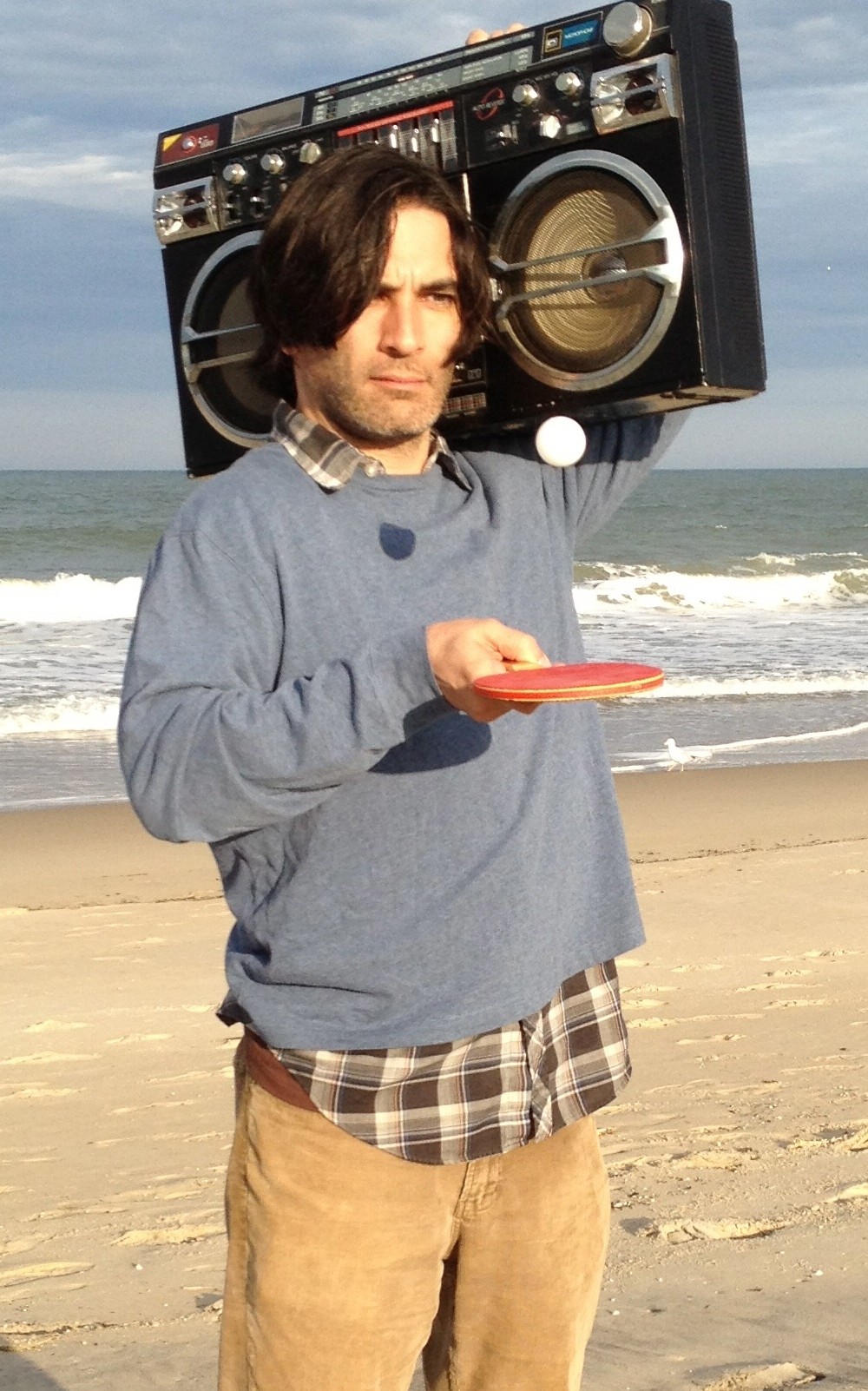 Yeah, well that did happen in post but the idea was formulated. Basically I’d say it’s not a rip-off but it’s an homage to the Wild Style opening credits, but that was always my idea to really establish the 80’s credibility to have almost handmade animation like Wild Style. With the rap song but it’s an 80’s coming-of-age comedy, you know? A beach vacation movie. But it didn’t really come to life until Teddy Blanks, who is a designer and he does all sorts, he’s hyper talented and CHIPS NY is their’ company, Teddy and some guys. Teddy is the one I pitched him on the idea, showed him the Wild Style credits and said, “I want you to have fun with this.” I didn’t want to say, “Do exactly that.” He’s the one who came up with the idea of what if we break it into the producers have records, the department heads have the slushy machine and things like that. It’s the kind of way I like to make movies. Have an idea, a strong belief that you have some cool ideas but then hire people who are way smarter and more creative than you to take it to a whole nother level.
Yeah, well that did happen in post but the idea was formulated. Basically I’d say it’s not a rip-off but it’s an homage to the Wild Style opening credits, but that was always my idea to really establish the 80’s credibility to have almost handmade animation like Wild Style. With the rap song but it’s an 80’s coming-of-age comedy, you know? A beach vacation movie. But it didn’t really come to life until Teddy Blanks, who is a designer and he does all sorts, he’s hyper talented and CHIPS NY is their’ company, Teddy and some guys. Teddy is the one I pitched him on the idea, showed him the Wild Style credits and said, “I want you to have fun with this.” I didn’t want to say, “Do exactly that.” He’s the one who came up with the idea of what if we break it into the producers have records, the department heads have the slushy machine and things like that. It’s the kind of way I like to make movies. Have an idea, a strong belief that you have some cool ideas but then hire people who are way smarter and more creative than you to take it to a whole nother level.
Getting to the music, what was that process? It’s a perfect soundtrack. Was it a long process to get the rights to the music?
That’s one of the hardest things to make our movies feel like real movies. As an independent filmmaker everything is just trying to keep our movie feeling small and it was really important, and the producers, to their credit, really supported that approach. To say we need to clear some real songs from the era. But it was Jonathan McHugh, our music supervisor, who really made it happen. And then in conjunction with that we said, “OK, let’s clear 12 songs.” So we did that, but the real sort of MVP is Michael Montes, the composer because he was responsible for doing four different themes. He did the rap theme which is the legitimate 80’s hip-hop but then for Stacy he had the dreampop, like the John Hughes movie, the ethereal pop and then for the bad guys he did kind of like Miami Vice, the electro stuff, and then for Randi Jammer stuff he did something really orchestral, almost like an Amblin Entertainment/Steven Spielberg/E.T. kind of thing from an 80’s movie.
So when you were able combine real songs, have some in the background — and not overload your movie by making it a wall-to-wall greatest hits, and we couldn’t have afforded to anyway — but to have someone like Michael submitting and he did our last movie, Septien, we were talking about it before we were even shooting. So some of those cues, like the opening cues of the movie, the rap theme, Michael did that months before we even shot the movie and it really helped me to get into the zone and it helped with the editor because I don’t like using temp music because you start to fall in love with it in the edit and then you have to kill your darlings, so to have a composer that you trust and you’re on the same page working before you get into the edit and then you can send some cues to the editor and you know that these cues, you know they are going to change a little bit based on the edit, but you know if you wanted to these are cues that could end up in the finished film and some of them actually did.
When it comes to casting, how did Marcello Conte come aboard?
Yeah, I really wanted to have someone that wasn’t an actor, capital actor or even lowercase actor. I do think he is an actor and it’s a really hard thing to do, to not emote and just sort of be quieter and I just trusted. We didn’t want to make Rad Miracle a Napoleon Dynamite, a flamboyant, larger-than-life character. He sort of just a little shell that all the weirdness is happening around him. And with Marcello, one of our producers, Michael Gottwald, did Beasts of the Southern Wild and he was handling a lot of the grassroots casting where they found Quvenzhané Wallis for that. So I went around the state of Maryland the months before with friends and my wife and we’d just sort of put the word out and say, “We’re going to be at the library. You don’t have to be an actor. You don’t have to read lines, but we just want to see as many kids as possible.” Then we had a woman in Ocean City who was helping us connect with the people of the town and she helped us with housing and stuff like that. Ruth Waters is her name. When we did our Ocean City audition, she goes,” Oh, my nephew and niece are down from New Jersey and they’re in town and so they are just going to pop in for the audition anyway.” She played it really cool. And I said that’s fine. Then after Marcello left, his sister, she’s an extra in the movie so she was great too, but Marcello, I was just like, “I’m really glad you brought your nephew.” It wasn’t until halfway through the shoot that he told me he intentionally came down just for the audition and he really wanted to be in the movie, but I did not know that until halfway through shoot.
That’s great. With Susan Sarandon on board did that help you get more prominence for the movie in terms of funding? Just having a big name?
The Susan thing was just massive because it helped it feel real and legitimate at the same time. It’s kind of depressing, if you’re not a filmmaker you would think the next morning you have the money in the bank. That was not the case. But in the sense of people taking us seriously to consider the movie and invest in it and then the ability to reach out then to something like Lea Thompson or John Hannah, these other really great, established actors, when you have someone like Susan Sarandon, a letter of intent from them, it becomes so much easier in the regard. But in the sense is the money in the bank the next morning? Unfortunately not. At least in this case it wasn’t. We were really scraping it together to pull it off. But the reality is it wouldn’t have happened had Susan not committed in April and we were shooting in September and that just sort of made it real in a way it wouldn’t have been if it was just me going around saying, “It’ll be cool! I promise.” That’s not good enough for someone to give thousands of dollars to your movie. So I would say it was invaluable. It was an incredible boost to making the movie real but in the sense of did we have the money the next morning? No, unfortunately not.
You’re partnering with Gravitas Ventures to release this, correct? And it’s going to be VOD as well as theatrical.
Yeah, Gravitas is incredible because I’ve known them through Hammer to Nail as they’ve only been a video on demand company and they started in 2006 and I really liked what they were doing but it wasn’t until last fall that they decided, “OK, we have the VOD thing down. Let’s try and do some theatrical stuff.” So we’re kind of a guinea pig. They’ve done a few, but this one, they do the P&A commitment, the print and advertising, and it seems like they are going above and beyond and our contract with them was 10 major markets for theatrical like New York, LA, etc. Typically, contractually, they could have just done that and been like, “OK, wipe our hands clean. That’s the 10 markets and we’ll just try and push to VOD. But to their credit they realized that the heart and soul of this movie is in the Maryland area so they’re like, “Yes, let’s book it in Ocean City. Let’s book it in Delaware Beach theaters.” So they’re going above an beyond even what they told us contractually they were going to do and that’s where you just trust someone and if it’s a bigger company who could say, “Oh, wait. We have nine more movies this month we’re focusing on.” It’s just machine where just inserting movie and we’ll buy a New York Times ad and we’ll put one ad there and then it’s sort of like, “Good luck and we’ll see if it lands.” Gravitas is unbelievable. Between our publicists and our distributor, the one thing I’ll say is I’m not going to have any regrets if the movie doesn’t catch on
The other thing, I’m sure you’re familiar with the ultra VOD or pre-release video on demand rental where the movie’s available for a month and then it comes out in New York to get the Times review. I’m really cautious or skeptical of that as a filmmaker and as a sort of film writer just because I don’t know. I just think enough people will catch up with it and if they really want to see it, they’ll have seen it by then, so it’s almost like why are you even doing the theatrical? So luckily we’re putting most, if not all of our eggs, into the same day. So this Friday, June 6th, the movie’s going to be in about 18 screens and it’s going to be available on video on demand and I just feel like if you have Lea Thompson and Susan Sarandon doing The Today Show that week. Attention spans are so short now, so it’s like, OK, Susan Sarandon is on The Today Show on Monday or Tuesday and this Friday the movie is going to be available everywhere in America on video on demand if you want to watch it and in theaters probably somewhere pretty close to you, based on the country lay-out. If you say, now it’ll be in theaters in three weeks after video demand is opening it gets really cloudy and attention spans, people forget when it’s available and on what. We are going to be doing booking throughout the summer, but really saying, let’s just focus on June 6th, and see from there, because I really think the idea of doing just a NY/LA release and hoping it catches fire and spreading it’s a really difficult thing to do, to sort of win that lottery, to have a really great showing in just NY or LA and then hope it’ll catch fire elsewhere.
Well, best of luck. It sounds like a great plan. I totally agree with you. I never understand the 30-day wait.
Yeah, it’s so weird. I even did that with The Sacrament, the Ti West movie. I was like, I know it’s going to be opening here in June and it’s May now and I’m home and I know I can watch it so I’m going to do it now. For the distributor, they don’t care. They’re happy. Did you rent the movie and pass us money? Yes, but I don’t feel for that maximum impact, unless you’re a bigger studio now, the video on the demand thing in the indie world is not going away. I actually really think it’s cool. I like the idea that my cousin in Georgia can watch the movie next Friday along with people in NY and Maryland who can go see it. So I’ve come around. At first I was an old school, theatrical-only guy and now I think video on demand in conjunction with theatrical, provided they are happening at the same time, I think it’s really awesome actually.
That’s all I have. Congrats on the movie. Thanks so much for chatting.
Yeah, thanks so much for talking. Yeah, I like what you guys are doing as well so I guess so we should all keep fighting the fight. [Laughs]
Yeah, we’re trying our best to survive in a comic book movie world. [Laughs]
Yeah, I know. Well, hang in there and thanks so much for doing this.
Thanks, take care.
Ping Pong Summer hits VOD and limited release this Friday, June 6th.

